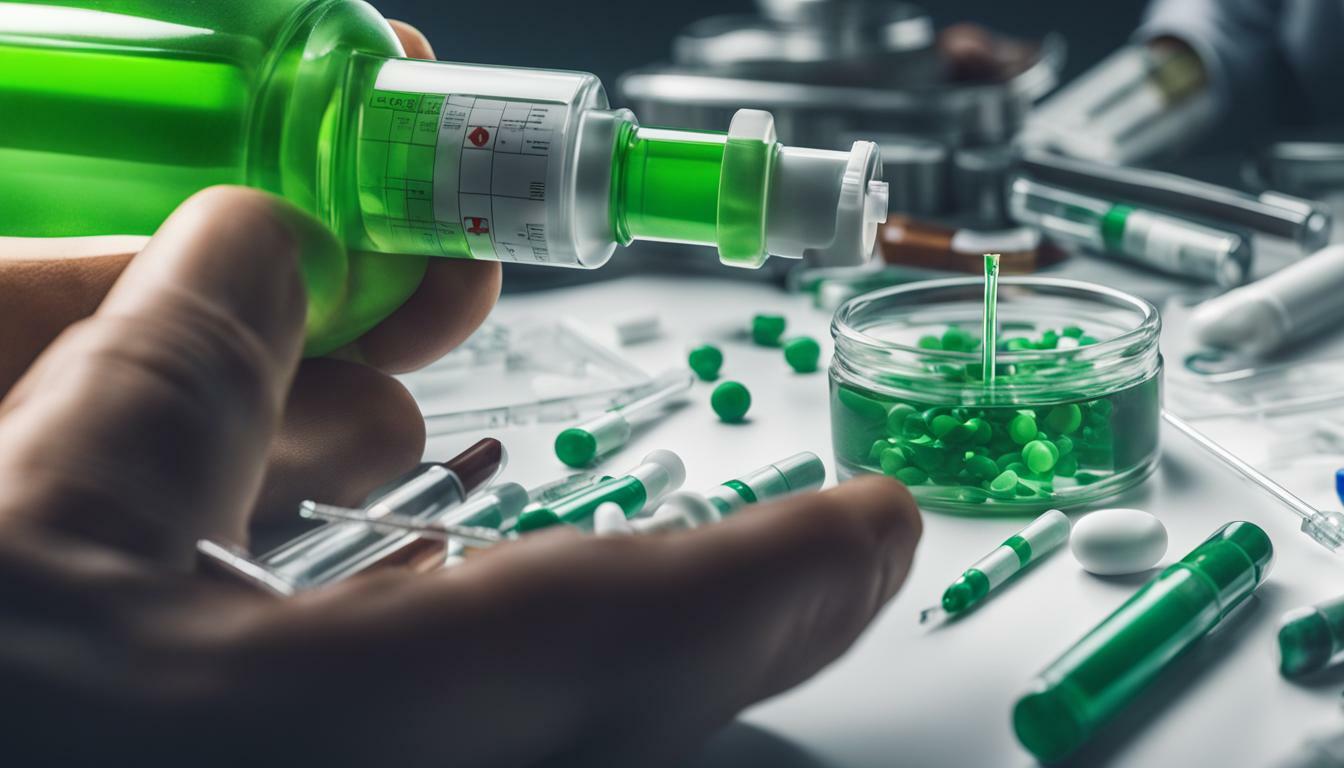
Human growth hormone (HGH) is a powerful hormone that plays a crucial role in regulating growth and body composition. It is naturally produced by the pituitary gland and has been synthetically produced for medical purposes with FDA approval. However, it is important to note that using HGH for non-FDA approved purposes, such as muscle building and anti-aging, can be unsafe.
When taken improperly, HGH can have harmful effects on your health. Potential side effects include pain, swelling, carpal tunnel syndrome, and high cholesterol levels. HGH use can also increase the risk of diabetes and contribute to the growth of cancerous tumors.
If you are considering using HGH, it is crucial to consult a doctor before starting any form of treatment. A medical professional can assess whether HGH is appropriate for your specific needs and can provide guidance on proper dosage and administration techniques.
Under medical supervision, HGH therapy can be beneficial for individuals with FDA-approved medical conditions. Following the prescribed guidelines and instructions is essential for maximizing the benefits and minimizing potential risks.
Remember, taking HGH safely is a priority. Only use HGH under medical supervision and follow the guidance provided by your healthcare professional. Your health and well-being should always be your top priority.
Understanding HGH Dosage and Administration Techniques
Determining the right HGH dosage and understanding the correct administration techniques is vital for safe and effective usage. Human growth hormone (HGH) is a powerful hormone that is naturally produced by the pituitary gland, and it plays a crucial role in regulating growth, body composition, and other important bodily functions.
When using HGH for medical purposes, it is essential to follow the prescribed dosage provided by your doctor. The dosage will depend on the specific medical condition being treated and your individual needs. It is important to note that using HGH for purposes not approved by the FDA, such as muscle building or anti-aging, can be unsafe and is not recommended.
Administering HGH typically involves injection methods, as it is a protein hormone that cannot be taken orally. The most common method is subcutaneous injection, where the hormone is injected just below the skin. This method allows for the slow release of HGH into the bloodstream, mimicking the body’s natural production. It is crucial to follow proper injection techniques to ensure accurate dosage and minimize discomfort.
Injection Techniques
When administering HGH injections, it is important to follow these recommended techniques:
- Wash your hands thoroughly before starting the process.
- Clean the injection site with alcohol swabs to minimize the risk of infection.
- Use a new, sterile needle and syringe for each injection.
- Pinch the skin at the injection site and insert the needle at a 45-degree angle.
- Inject the HGH slowly and steadily.
- After injecting, release the skin and gently massage the area to disperse the hormone.
It is important to note that HGH injections should be administered under the guidance of a healthcare professional. They can provide proper training on injection techniques and ensure that you are using the correct dosage for your specific needs.
In conclusion, understanding the correct dosage and administration techniques for HGH is crucial to ensure safe and effective usage. By following the prescribed dosage and utilizing proper injection methods, you can maximize the benefits of HGH therapy while minimizing the potential risks and side effects associated with its use. Always consult a doctor before considering HGH therapy and ensure that you undergo medical supervision throughout the process.
Important Guidelines for HGH Therapy
Adhering to specific guidelines and instructions is crucial when undergoing HGH therapy to ensure optimal results. HGH, or human growth hormone, is a hormone produced by the pituitary gland that plays a vital role in growth, body composition, and various bodily functions. While synthetic HGH is approved by FDA for treating certain medical conditions, using it for unauthorized purposes, such as muscle building or anti-aging, can be risky and potentially harmful.
When considering HGH therapy, it is essential to consult a doctor who specializes in hormone therapy. They will evaluate your specific needs and determine if HGH is the right option for you. Your doctor will also guide you on the proper dosage, frequency, and duration of treatment. Following their instructions diligently is crucial to avoid any potential side effects and to achieve optimal results.
During HGH therapy, it is important to monitor your progress regularly. Your doctor will perform regular check-ups, including blood tests, to assess your response to the treatment. This allows any necessary adjustments to be made to ensure your safety and effectiveness of the therapy.
| HGH Therapy Guidelines |
|---|
| Consult a specialized doctor |
| Follow recommended dosage and timing |
| Maintain medical supervision throughout the treatment |
| Regularly monitor your progress through check-ups and blood tests |
In addition to medical supervision, adopting a healthy lifestyle is crucial for optimal results during HGH therapy. This includes maintaining a balanced diet, engaging in regular exercise, and getting sufficient sleep. These lifestyle factors can help maximize the benefits of HGH therapy and contribute to overall well-being.
Safety Precautions When Taking HGH
Prioritizing your health and safety when taking HGH involves following important safety precautions and implementing best practices. While HGH can be beneficial when used properly, it is essential to be aware of potential risks and take appropriate measures to minimize them.
Firstly, it is crucial to consult with a qualified healthcare professional before considering any form of HGH. They will assess your medical history, conduct necessary tests, and determine if HGH is suitable for your specific needs. This step ensures that you receive the proper guidance and supervision throughout your HGH journey.
When using HGH, it is important to adhere to the recommended dosage and administration techniques. This typically involves injecting the hormone subcutaneously or intramuscularly. Proper injection technique, hygiene, and site rotation are essential to prevent infections, abscesses, and other injection-related complications.
In addition to dosage and administration, it is crucial to monitor your progress regularly with the help of a healthcare professional. Regular blood tests and physical examinations will allow them to assess your response to HGH and make any necessary adjustments to your treatment plan.
| Key Safety Precautions for HGH Use: |
|---|
| Always use HGH as prescribed by your doctor. |
| Follow proper injection techniques and hygiene practices to prevent infections. |
| Rotate injection sites to avoid tissue damage and scarring. |
| Regularly monitor your progress and seek medical attention if you experience any adverse effects. |
| Do not share needles or HGH devices with others to prevent the spread of infections. |
| Store HGH as instructed and keep it out of reach of children. |
By following these safety precautions and best practices, you can help ensure that your HGH use is as safe and effective as possible. Remember, HGH should only be used under medical supervision, and it is vital to communicate openly with your healthcare provider throughout your treatment.
Potential Side Effects of HGH
Like any medication, HGH can have side effects, and it is important to be aware of them before starting treatment. While HGH has been approved by the FDA for specific medical conditions, the use of synthetic HGH for non-approved purposes, such as muscle building or anti-aging, can lead to various adverse effects.
Common side effects of HGH use include pain and swelling at the injection site. Some individuals may also experience carpal tunnel syndrome, which can cause numbness, tingling, and weakness in the hand and arm. It is important to monitor these symptoms and inform your doctor if they persist or worsen.
Furthermore, taking HGH can increase cholesterol levels, which may lead to cardiovascular risks. It is crucial to regularly check your cholesterol levels and maintain a healthy lifestyle to minimize these risks. Additionally, HGH use can potentially contribute to the growth of cancerous tumors. Therefore, it is essential to undergo regular medical supervision and screenings while using HGH to monitor for any potential complications.
| Common Side Effects: | Rare Side Effects: |
|---|---|
|
|
Consulting a doctor before considering HGH treatment is crucial to evaluate the potential benefits and risks based on your specific medical history and condition. Only use HGH under medical supervision to ensure proper monitoring and adjustment of dosage. Your doctor will help determine the appropriate treatment plan and monitor your progress to ensure the safety and effectiveness of HGH therapy.
Consulting a Doctor and Medical Supervision
Before embarking on HGH treatment, consulting a trusted doctor and undergoing medical supervision is essential for personalized guidance and monitoring. Being under the care of a medical professional ensures that you receive the most accurate information and appropriate dosages specific to your needs.
Your doctor will assess your overall health and determine if HGH is a suitable option for you. They will take into consideration any existing medical conditions, medications you may be taking, and potential risks and benefits associated with HGH use. Through this personalized evaluation, your doctor can help you make an informed decision about whether HGH therapy is the right choice for you.
During your consultation, it is important to openly discuss your goals and expectations with your doctor. This will allow them to tailor the treatment plan to align with your desired outcomes. Furthermore, your doctor will guide you through the proper administration techniques, ensuring that you understand how to safely inject HGH, if that is the chosen method of delivery.
Regular check-ups and follow-up appointments will be scheduled to monitor your progress and assess any potential side effects. Your doctor will make adjustments to the treatment plan as necessary to optimize your results and minimize any adverse effects. Remember, HGH should only be used under medical supervision to ensure your safety and well-being throughout the course of the treatment.
| Benefits of Consulting a Doctor and Undergoing Medical Supervision: |
|---|
| Personalized guidance based on your unique health profile |
| Accurate dosing recommendations tailored to your needs |
| Monitoring of progress and adjustment of treatment plan as necessary |
| Expert advice on administration techniques for safe usage |
| Identification and management of any potential side effects |
Conclusion
Safely taking human growth hormone (HGH) is crucial for maximizing its benefits and minimizing potential risks, and consulting a doctor is essential for personalized guidance and supervision.
Taking HGH without proper medical supervision can have harmful effects. Although HGH is naturally produced by the pituitary gland and plays a vital role in regulating growth and body composition, using it for purposes not approved by the FDA can be risky. Synthetically produced HGH is only FDA-approved for the treatment of specific medical conditions in children and adults.
Potential side effects of HGH use include pain, swelling, carpal tunnel syndrome, and high cholesterol levels. Additionally, it can increase the risk of diabetes and contribute to the growth of cancerous tumors. These risks highlight the importance of using HGH under medical guidance.
Before considering any form of HGH, it is essential to consult a doctor who can provide personalized guidance based on your specific needs. They will determine whether HGH therapy is appropriate for you and monitor your progress to ensure its safety and effectiveness. Your doctor will also be able to advise you on the proper dosage, administration techniques, and necessary precautions to minimize potential risks.
